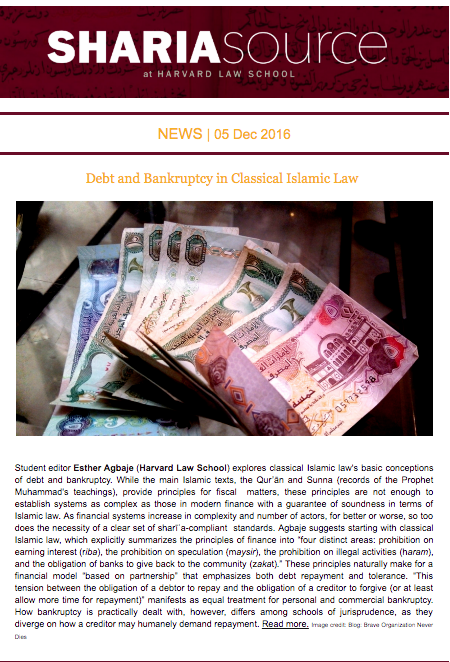
 Debt and Bankruptcy in Classical Islamic Law Student editor Esther Agbaje (Harvard Law School) explores classical Islamic law’s basic conceptions of debt and bankruptcy. While the main Islamic texts, the Qur’ān and Sunna (records of the Prophet Muhammad’s teachings), provide principles for fiscal matters, these principles are not enough to establish systems as complex as those in modern finance with a guarantee of soundness in terms of Islamic law. As financial systems increase in complexity and number of actors, for better or worse, so too does the necessity of a clear set of sharīʿa-compliant standards. Agbaje suggests starting with classical Islamic law, which explicitly summarizes the principles of finance into “four distinct areas: prohibition on earning interest (riba), the prohibition on speculation (maysir), the prohibition on illegal activities (haram), and the obligation of banks to give back to the community (zakat).” These principles naturally make for a financial model “based on partnership” that emphasizes both debt repayment and tolerance. “This tension between the obligation of a debtor to repay and the obligation of a creditor to forgive (or at least allow more time for repayment)” manifests as equal treatment for personal and commercial bankruptcy. How bankruptcy is practically dealt with, however, differs among schools of jurisprudence, as they diverge on how a creditor may humanely demand repayment. Read more. Image credit: Blog: Brave Organization Never Dies
Debt and Bankruptcy in Classical Islamic Law Student editor Esther Agbaje (Harvard Law School) explores classical Islamic law’s basic conceptions of debt and bankruptcy. While the main Islamic texts, the Qur’ān and Sunna (records of the Prophet Muhammad’s teachings), provide principles for fiscal matters, these principles are not enough to establish systems as complex as those in modern finance with a guarantee of soundness in terms of Islamic law. As financial systems increase in complexity and number of actors, for better or worse, so too does the necessity of a clear set of sharīʿa-compliant standards. Agbaje suggests starting with classical Islamic law, which explicitly summarizes the principles of finance into “four distinct areas: prohibition on earning interest (riba), the prohibition on speculation (maysir), the prohibition on illegal activities (haram), and the obligation of banks to give back to the community (zakat).” These principles naturally make for a financial model “based on partnership” that emphasizes both debt repayment and tolerance. “This tension between the obligation of a debtor to repay and the obligation of a creditor to forgive (or at least allow more time for repayment)” manifests as equal treatment for personal and commercial bankruptcy. How bankruptcy is practically dealt with, however, differs among schools of jurisprudence, as they diverge on how a creditor may humanely demand repayment. Read more. Image credit: Blog: Brave Organization Never Dies
 LEGISLATION: Laws of Malaysia, Act 276: Islamic Banking Act 1983 When Malaysian officials established a centralized Islamic financial system with its 1983 Islamic Banking Act, they avoided issues of bankruptcy and debt. Instead, Malaysia handles bankruptcy according to banking principles familiar to its foreign investors, as evidenced in its Bankruptcy Act of 1967. U.S. editor Abed Awad explains that such moves occur because bankruptcy in classical Islamic law is “strongly analogous to the traditional civil and common law treatment of bankrupts prior to the enactment of Chapter 11,” when debt repayment was the goal, not preserving a business enterprise. Read more. Image credit: Channel News Asia
LEGISLATION: Laws of Malaysia, Act 276: Islamic Banking Act 1983 When Malaysian officials established a centralized Islamic financial system with its 1983 Islamic Banking Act, they avoided issues of bankruptcy and debt. Instead, Malaysia handles bankruptcy according to banking principles familiar to its foreign investors, as evidenced in its Bankruptcy Act of 1967. U.S. editor Abed Awad explains that such moves occur because bankruptcy in classical Islamic law is “strongly analogous to the traditional civil and common law treatment of bankrupts prior to the enactment of Chapter 11,” when debt repayment was the goal, not preserving a business enterprise. Read more. Image credit: Channel News Asia
 COMMENTARY: Is Sharīʿa Incompatible with the Modern Administrative State? Anver Emon (Professor of Law at the University of Toronto Faculty of Law and SHARIAsource senior scholar) has a new paper on “Codification and Islamic Law” that challenges the now popular argument that Islamic law is near-impossible to formalize as state law. Treating Islamic law as “law” fails, he argues, when folks reduce definitions of sharīʿa and the state to fit a narrow idea of the state: the modern administrative state. Fitting Islamic law into a centralized bureaucratic institution loses the spirit of what is “law” and explains the assumed incompatibility. Read more. Image credit: The Library of Liberty and Law
COMMENTARY: Is Sharīʿa Incompatible with the Modern Administrative State? Anver Emon (Professor of Law at the University of Toronto Faculty of Law and SHARIAsource senior scholar) has a new paper on “Codification and Islamic Law” that challenges the now popular argument that Islamic law is near-impossible to formalize as state law. Treating Islamic law as “law” fails, he argues, when folks reduce definitions of sharīʿa and the state to fit a narrow idea of the state: the modern administrative state. Fitting Islamic law into a centralized bureaucratic institution loses the spirit of what is “law” and explains the assumed incompatibility. Read more. Image credit: The Library of Liberty and Law
See the full newsletter.

